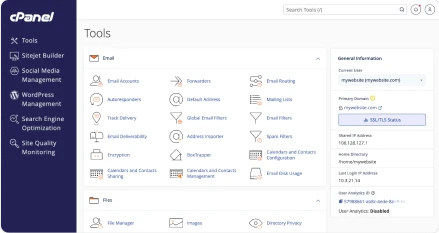As your hosting business grows, managing multiple accounts, ensuring customer satisfaction, and maintaining server performance can become increasingly complex. Effectively, you’ll be scaling up to meet demand, which is undoubtably exciting, but comes with its own demands.
Automation is one of the main keys to scaling your operations efficiently. cPanel and WHM offer a suite of built-in automation tools that will streamline management and customer support, allowing you to focus on growing your business. In this guide, you’ll learn what hosting automation means, why it’s important even for smaller teams, and how to start automating the right tasks with the tools you already use — like WHM, cPanel, and WHMCS.
Short Summary
- The article explains how to scale a hosting business using automation tools in cPanel & WHM.
- cPanel & WHM provide built-in tools that reduce manual workload, allowing hosting businesses to scale efficiently without sacrificing quality or performance to enhance customer satisfaction.
- Pairing cPanel/WHM with tools like WHMCS and JetBackup enables seamless automation across billing, support, and backup systems.
- Automated updates, server monitoring, and resource alerts ensure that performance and security scale along with the business.
- Automate account management, billing, domain registration, SSL and backups to maintain efficiency and consistency.
What is Hosting Automation?
Hosting automation means letting software handle tasks that would normally take up your time. Instead of manually creating new accounts, setting up packages, or sending invoices, an automated system does it for you — faster and without mistakes.
For example:
- When a new customer buys a hosting plan, automation can instantly set up their account in WHM/cPanel.
- It can send out their welcome email with login details.
- If a customer doesn’t pay on time, it can suspend the account automatically.
- It can generate invoices, process payments, and handle renewals.
- Routine maintenance, like backups and system updates, can run on a set schedule without manual work.
This frees you up to focus on supporting customers and growing your business — not chasing invoices or fixing setup errors.
Benefits of Automation in Hosting
Automation can significantly enhance the efficiency and scalability of your hosting business, by taking away repetitive and at times complicated tasks for both you and your users. Some of the key benefits include:
- Time Savings: Automating repetitive tasks frees up time for more strategic activities.
- Consistency: Automated processes ensure consistent performance and reduce the risk of human error.
- Scalability: Automation allows you to manage a growing number of accounts without a proportional increase in workload.
- Customer Satisfaction: Faster response times and reliable services improve customer satisfaction and retention.
- Expanded Customer Offerings: Think plug-and-play tools like AI website builders, social media management, and much more.
- Better Security: By automating updates, backups, and monitoring, you lower the risk of vulnerabilities and security breaches: these are all must-haves in today’s threat landscape.
“Nearly two-thirds of CFOs say their companies have a strategic priority to automate tasks typically performed by employees. Among firms that plan to automate in the next 12 months, a majority expect to implement AI to perform a wide range of tasks.”
U.S. Companies Ramp Up Automation and AI as Inflation Persists

Automation Features in cPanel & WHM
cPanel & WHM offer a range of automation features that can streamline various aspects of your hosting business, making life simpler for both you and your users. Here are some of the most valuable tools and how to use them effectively:
1. Account Management Automation
Managing multiple hosting accounts manually can be time-consuming. cPanel and WHM provide several tools to automate account management, ensuring simplicity of use as well as making more mundane tasks a thing of the past. Some of the tools include:
- Account Creation and Termination: WHM allows you to automate the creation and termination of cPanel accounts. You can set up predefined packages and use the “Create a New Account” and “Terminate an Account” features to streamline these processes.
- Account Suspension: Automate account suspension for non-payment or policy violations using WHM’s “Manage Account Suspension” feature.
- Automated Backups: Use WHM’s “Backup Configuration” to schedule regular backups of all accounts. This ensures data safety and quick recovery in case of issues.
2. Billing and Invoicing Automation
Efficient billing and invoicing are crucial for maintaining growth and customer satisfaction: a bad billing experience is a sure-fire way to lose customers, fast and forever. WHMCS (WebHost Manager Complete Solution) integrates seamlessly with cPanel & WHM to automate billing processes:
- Automated Invoicing: WHMCS generates and sends invoices automatically based on your billing cycle.
- Payment Processing: Integrate payment gateways with WHMCS to automate payment processing and reduce manual intervention.
- Renewal Reminders: WHMCS can send automated reminders to customers about upcoming renewals, reducing the risk of service interruptions.
3. Domain Management Automation
Managing domains efficiently is essential for any and all hosting business: it’s one of the most important services this type of business offers, and being able to do it effectively is paramount of ensuring your continued survival in an increasingly competitive landscape. cPanel & WHM offer tools to automate domain-related tasks:
- DNS Management: Automate DNS zone creation and management using WHM’s “Edit DNS Zone” and “Add a DNS Zone” features.
- Domain Registration: Integrate with domain registrars to automate domain registration and renewal processes.
- SSL Certificates: Use WHM’s “AutoSSL” feature to automatically issue and renew SSL certificates for your customers’ domains.
4. Server Management Automation
Maintaining server performance and security is critical for a hosting business. Security will most likely be at the top of the list for any hoster and their customers, so ensuring continuous safety is incredibly important. cPanel & WHM provide several automation tools to help, including:
- Server Monitoring: Use WHM’s “Service Status” and “Process Manager” to monitor server performance and automate alerts for any issues.
- Security Updates: Automate security updates and patches using WHM’s “Update Preferences” feature.
- Resource Allocation: Automate resource allocation and management using WHM’s “Resource Monitor” to ensure optimal server performance.
5. Customer Support Automation
Providing excellent customer support is essential for retaining customers: any business will be judged by how their customers can interact with it, and how well they find their queries and concerns taken care of. Having great tools is, of course, an important part of the process, but having a great attitude with how you manage and solve customer concerns and problems is the key to standing out in a saturated market. cPanel & WHM offer tools to automate and streamline support processes:
- Support Ticket System: Integrate WHMCS with a support ticket system to automate ticket creation, assignment, and tracking.
- Knowledge Base: Create a comprehensive knowledge base within WHMCS to provide customers with self-help resources and reduce support requests.
- Automated Responses: Use predefined responses and automation rules to handle common support queries quickly and efficiently.
Benefit From Future Innovation
To maximize the benefits of automation, it’s essential to follow a set of important rules on best practices, including:
1. Plan and Prioritize
Identify the most time-consuming and repetitive tasks in your hosting business and prioritize them for automation. Start with tasks that have the highest impact on efficiency and customer satisfaction.
2. Use Reliable Tools
Choose reliable automation tools that integrate seamlessly with cPanel & WHM. WHMCS is a popular choice for billing and support automation, while tools like JetBackup can enhance backup automation.
Another important aspect of this is not being afraid to add more tools as your business grows. Integrating new tools to deal with new challenges with your existing ones if key to accelerating growth and ensuring your customers are happy.
3. Monitor and Optimize
Regularly monitor the performance of your automated processes and adjust as needed. Use WHM’s monitoring tools to track server performance and resource usage.
4. Train Your Team
Ensure your team is well-trained in using cPanel & WHM’s different automation features. Provide ongoing training and support to help them adapt to new tools and processes, as well as ensuring you’re optimizing their performance, giving them the tools they need to succeed.
5. Maintain Security
Automation can introduce security risks if not implemented correctly. Ensure you and your team are following security best practices, such as using strong passwords, enabling two-factor authentication, and keeping software up to date. It’s important that team members are kept up to date with the latest security must-dos, and that they know about the importance of a robust security protocol.
6. Gather Feedback
Regularly gather feedback from your customers and team to identify areas for improvement. Use this feedback to refine your automation processes and enhance customer satisfaction. This might seem simple, but you’d be surprised at how often businesses suffer when they don’t listen to their clients.
How to Get Started with Hosting Automation
If you’re just starting out, you don’t need to automate everything at once. These are the basics to consider:
- Set Up WHMCS: Connect your WHMCS installation with your WHM/cPanel servers. WHMCS will handle customer sign-ups, package creation, domain registrations, and billing automatically.
- Automate Backups: Use cPanel’s built-in backup system or add a plugin to schedule daily or weekly backups for all accounts. This gives peace of mind to you and your customers.
- Enable Auto Updates: Turn on automatic updates for cPanel & WHM so your server stays secure with the latest patches — no manual updating required.
- Gradually Automate More: As you get comfortable, you can expand automation with extra plugins for security scanning, spam protection, or advanced resource monitoring.
- Add Monitoring Tools: Install basic server monitoring tools or plugins that alert you if your server goes down or resources run low. Many are beginner-friendly and free or low-cost.
Conclusion
Scaling your hosting business requires efficient management and customer support processes, and is likely to be an ongoing operation. By leveraging the automation features in cPanel & WHM, you can streamline operations, reduce manual workload, and improve customer satisfaction. Implementing best practices for automation will help you achieve seamless scalability and position your hosting business for long-term success.
If you’d like to learn more about how automation can help your business thrive, please get in touch!
FAQs – Frequently Asked Questions
Automation:
Saves time by eliminating repetitive tasks.
Increases consistency and reduces human error.
Supports growth without scaling up your workforce.
Enhances customer satisfaction through faster service delivery.
Account management (creation, suspension, backups)
Billing and invoicing (via WHMCS)
Domain services (DNS, SSL, registration)
Server performance monitoring and updates
Customer support (tickets, automated replies, knowledge base)
WHMCS integrates with cPanel & WHM to automate:
Invoicing and payment processing
Renewal reminders
Customer support ticketing
Domain management
Prioritize the most time-consuming tasks.
Use reliable tools like WHMCS, JetBackup.
Train your team regularly.
Monitor and optimize processes.
Maintain strong security practices.
Collect feedback from users and staff.
Yes, if not managed properly. Reduce risk by:
Keeping all software updated.
Using strong passwords and two-factor authentication.
Training staff in security protocols.
Absolutely. Automation enables:
Faster response times with auto-replies.
24/7 ticket creation and tracking.
Reduced support load through a well-maintained knowledge base.

